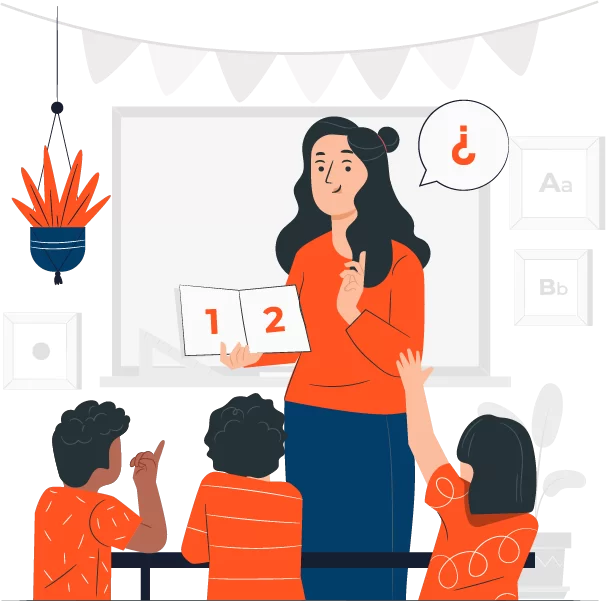Teaching assistants play a crucial role in helping and offering support to teachers across all educational intuitions.
The profession has become increasingly popular among individuals in the UK as TAs have become an integral part of primary and secondary schools and even higher institutions.
Nevertheless, the questions arise ‘How can you become a teaching assistant’? What are the requirements? What specific qualifications do you require to become a TA? Or How much can you earn annually?
We have answered all the main questions mentioned below. Read on to find out!
What is a Teaching Assistant?
The National Career Services UK states, ‘Teaching assistants support teachers and help children with reading, writing and learning activities.’
Teaching assistants help teachers with various learning activities and preparing resources; they also help students with emotional and social development. This academic and emotional support can be one-on-one, individual, or group-based; and no matter the size of the class, they make sure each student gets the same level of support and care.
How to Become a Teaching Assistant?
While a degree isn’t required to become a Teaching Assistant in the UK, having relevant qualifications can definitely work.
GCSEs (or equivalent) in English and Maths are typically a must-have.
Some courses you can consider are Level 2 Award in Teaching Assistant (Support Work in Schools) or Level 3 Certificate in Teaching Assistant (Supporting Teaching and Learning in Schools).
The good news is that you can typically enrol in Level 2 courses without prior school experience, and if you are already working in a school, you can go for a Level 3 Certificate.
Another interesting option to explore is an apprenticeship (Levels 2 or 3) which combines working as a TA with earning a qualification – a great way to gain experience while getting paid!

What Qualifications Do You Need to Become a Teaching Assistant?
You don’t need a specific qualification to become a teaching assistant. Many schools will require anyone wanting to be a teaching assistant to do literacy and maths tests, or at least will check on your GCSE English and Maths grades.
However, most learners pursue teaching assistant qualifications or courses to get started and enhance their knowledge.
They also choose:
- apprenticeships
- a college course
- to apply to schools directly to gain relevant experience
What is the Role of a Teaching Assistant?
Teaching assistants have a supporting role in the classroom. Working with the lead teacher, they provide additional support and instructions to students.
How much do Teaching Assistants Earn?
The average teaching assistant’s pay is between £18,000 to £23,000 per year; with level 3 and 4 qualifications, you can earn approximately £23,000 annually.
Do Teaching assistants get a pay rise?
Yes, teaching assistants do receive salary increases. Even though the starting salary is £18,000, it can increase with experience.
Those who complete the Level 4 Higher Level Teaching Assistant qualification can earn even more.
What are the Responsibilities of Teaching Assistants?
The responsibilities of a teaching assistant and day-to-day may vary from institution to institution in the UK. However, the general duties of a teaching assistant are:
- They help in preparing resources and supporting students in their learning activities, making sure that the learning material is delivered by the teachers effectively.
- They must make sure a learning yet positive environment is maintained throughout.
- They assess, record and report the learning. progress of the students.
- They provide extra support to students with special needs or learning disabilities.
- They are also responsible for motivating and encouraging students to complete their tasks.
- They assist students during study trips or other events.
- They are responsible for managing the behaviour of students and creating a supportive and positive environment.
- They take attendance and grade students’ work/assignments.
- They also make sure classrooms are tidy and clean.

Do Teaching Assistants Get Paid on Holidays?
Yes, teaching assistants do get paid on holidays but on one condition.
Most of the TAs are hired on term-time contracts with five weeks of paid holiday but only when the school is in session.
In opposition to that, if teaching assistants are hired on permanent full-time contracts and get paid on holidays whether the school is in session or not; their salaries are also evenly distributed over 12 months.
How to Become a Teacher from a Teaching Assistant?
The easiest way to become a teacher from a teaching assistant is to apply for an Initial Teacher Education or Training (ITET) with the Qualified Teacher Status (QTS).
To teach in primary and secondary institutions in the UK, you will require a Qualified Teaching Status (QTS); however, to teach in further education or early years education, you can teach without a QTS.
On the other hand, you might also ask ‘Can I teach without a degree’? In that case, you can apply for a Bachelor’s in Education with QTS which takes 3-4 years to complete and become a teacher.
And if you already have a degree, you can pursue a 1-year Postgraduate Certificate in Education (PGCE) with QTS.
To explore other teaching routes, read our blog: Can a Teaching Assistant Become a Teacher?
Conclusion
Being a teaching assistant is a great way to support teachers in schools. Becoming a teaching assistant is a fulfilling career path that offers the opportunity to make a positive impact on students’ lives.
The good thing is you don’t necessarily need a degree to become one, but some qualifications and experience would be helpful. Pursuing relevant courses or certifications can help enhance your knowledge and skills.
Once you become a TA your responsibilities include helping students with their learning, preparing resources, and maintaining a positive classroom environment.
Not only is that, being a teaching assistant a brilliant route into teaching as well. Teaching assistants have a lot of experience in schools; so, they understand and know exactly what they are getting into.



